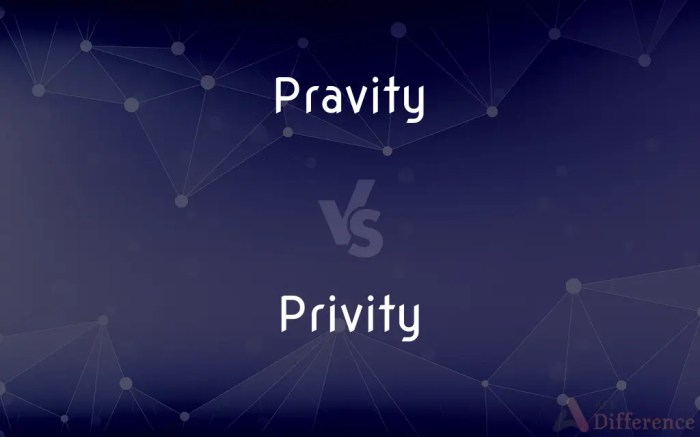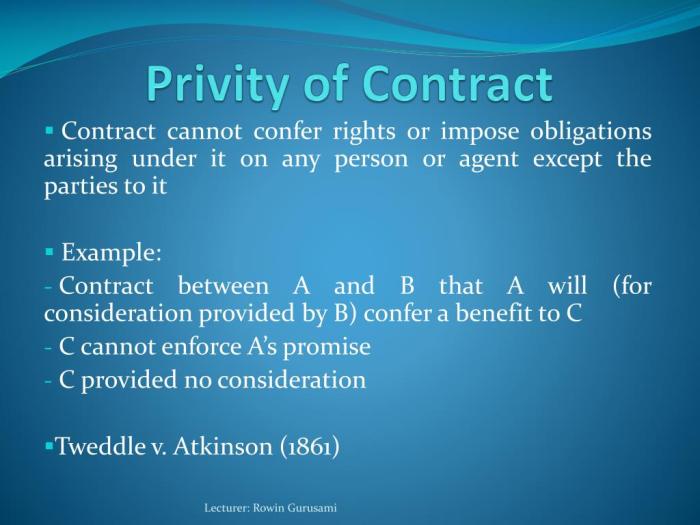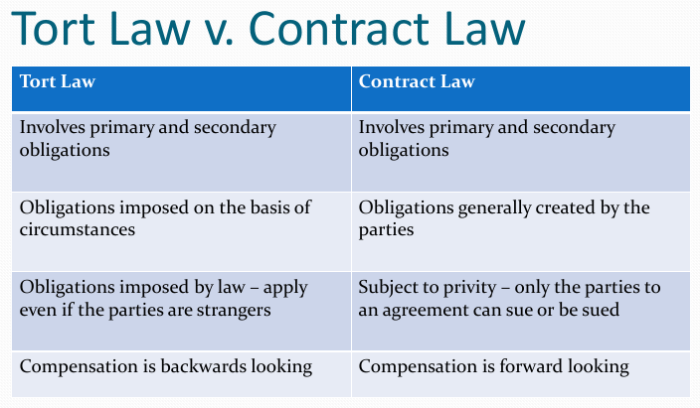Privity of contract vs privity of estate – In the realm of contract law, the concepts of privity of contract and privity of estate play pivotal roles in determining the rights and liabilities of parties involved in contractual agreements. Privity of contract establishes a direct legal relationship between the parties to a contract, while privity of estate involves the transfer of contractual rights and obligations to non-parties.
This comprehensive exploration delves into the intricacies of privity of contract and privity of estate, examining their distinct characteristics, exceptions, and implications for breach of contract remedies and defenses. By unraveling these fundamental principles, we gain a deeper understanding of the legal framework governing contractual relationships and the protection of parties’ interests.
Privity of Contract: Privity Of Contract Vs Privity Of Estate

Privity of contract is a common law doctrine that states that only the parties to a contract can sue or be sued for breach of that contract. This means that a third party who is not a party to the contract cannot sue or be sued for breach of that contract, even if they are harmed by the breach.
There are a few exceptions to the privity of contract rule. These exceptions include:
- Assignment:When a party to a contract assigns their rights under the contract to a third party, the third party becomes a party to the contract and can sue or be sued for breach of that contract.
- Novation:When a new contract is created that replaces an existing contract, the parties to the new contract become the parties to the old contract and can sue or be sued for breach of that contract.
- Estoppel:When a party to a contract makes a representation to a third party that they will be bound by the contract, the third party may be able to sue the party to the contract for breach of that contract, even if they are not a party to the contract.
Privity of Estate

Privity of estate is a common law doctrine that states that a person who acquires property from a party to a contract is bound by the terms of that contract. This means that the person who acquires the property can sue or be sued for breach of that contract, even if they were not a party to the contract.
There are a few exceptions to the privity of estate rule. These exceptions include:
- Disclaimer:When a person who acquires property from a party to a contract disclaims their interest in the property, they are not bound by the terms of that contract.
- Estoppel:When a person who acquires property from a party to a contract makes a representation to a third party that they will not be bound by the terms of that contract, the third party may be able to sue the person who acquired the property for breach of that contract, even if they are not a party to the contract.
Differences Between Privity of Contract and Privity of Estate

The main difference between privity of contract and privity of estate is that privity of contract applies to parties to a contract, while privity of estate applies to persons who acquire property from a party to a contract.
Another difference between privity of contract and privity of estate is that privity of contract is based on the parties’ agreement, while privity of estate is based on the transfer of property.
Finally, privity of contract can be created by assignment or novation, while privity of estate can only be created by the transfer of property.
Remedies for Breach of Contract

There are a number of remedies available for breach of contract. These remedies include:
- Damages:Damages are a monetary award that is designed to compensate the non-breaching party for the losses they have suffered as a result of the breach of contract.
- Specific performance:Specific performance is a court order that requires the breaching party to perform the terms of the contract.
- Injunction:An injunction is a court order that prohibits the breaching party from doing something.
- Rescission:Rescission is a court order that cancels the contract and restores the parties to the positions they were in before the contract was entered into.
Defenses to Breach of Contract
There are a number of defenses that can be asserted to a breach of contract claim. These defenses include:
- Statute of limitations:The statute of limitations is a law that sets a time limit on the amount of time that a party has to file a lawsuit for breach of contract.
- Lack of capacity:A party may be able to avoid liability for breach of contract if they lacked the capacity to enter into the contract.
- Mistake:A party may be able to avoid liability for breach of contract if they entered into the contract based on a mistake.
- Fraud:A party may be able to avoid liability for breach of contract if they were induced to enter into the contract by fraud.
- Duress:A party may be able to avoid liability for breach of contract if they were forced to enter into the contract under duress.
- Undue influence:A party may be able to avoid liability for breach of contract if they were unduly influenced to enter into the contract.
- Impossibility:A party may be able to avoid liability for breach of contract if it was impossible for them to perform the terms of the contract.
- Frustration of purpose:A party may be able to avoid liability for breach of contract if the purpose of the contract has been frustrated.
FAQ Corner
What is the key difference between privity of contract and privity of estate?
Privity of contract establishes a direct legal relationship between the parties to a contract, while privity of estate involves the transfer of contractual rights and obligations to non-parties who inherit or acquire contractual interests.
Can a non-party to a contract sue for breach of contract?
Generally, non-parties cannot sue for breach of contract due to the lack of privity of contract. However, there are exceptions, such as third-party beneficiaries and assignments.
How does privity of estate affect the availability of remedies for breach of contract?
Privity of estate allows non-parties who inherit or acquire contractual interests to seek remedies for breach of contract, even though they were not originally parties to the agreement.